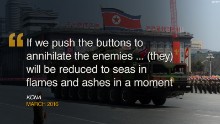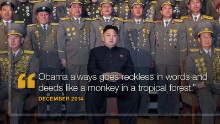Dynastic Imperialism : Democratic Peoples Republic of Korea
"Sanctions have already been imposed on almost everything possible, so the policy is at an impasse."
"In reality, the means by which the United States, South Korea and Japan can put pressure on North Korea have reached their limits."
Tadishi Kimiya, Korean issues professor, University of Tokyo
"There is a logic to the North Korean state, a deep and deadly serious logic."
"[North Korea] is a dangerous state -- dangerous, not lunatic -- and fully intent upon becoming more than dangerous still."
"We have absolutely no common point of reference with the world view or moral compass or first premises of the closed-society decision-makers who control the North Korean state."
Nicholas Eberstadt, political economist, American Enterprise Institute

"Almost nothing can be done diplomatically to dissuade North Korea from abandoning its nuclear program. It will consistently cheat on any agreement."
"Rather than hanging on to the fantasy that Pyongyang can be cajoled into relinquishing its nuclear weapons, the United States should consider adopting a more traditional deterrent policy against North Korea."
"Washington should state that if Pyongyang launches a nuclear-armed ballistic missile, the United States will respond with a full U.S. attack on North Korea."
"The only sure way of ending North Korea's nuclear threat is to change the regime in Pyongyang. Denuclearization will not happen as long as Kim and his junta are in power."
Michael Auslin, director, Japan Studies, American Enterprise Institute
 |
| Photos: North Korea's weapons tests |
It doesn't appear that China would consider 'stepping in' militarily to put a halt to its protege's incessant and unappeasable appetite to provoke and threaten its near neighbours and the United States, despite Beijing's stated and no doubt sincere condemnation of Pyongyang's pushing the envelope on world stability.
Short of seeing Japan, a powerful country but one whose military has been kept in harness since World War II, commit to risking China's wrath by stopping North Korea, how likely is it that the United States will bring military power to bear?
It is the United States, after all, that speaks of Pakistan as an indispensable ally in the global fight against terror. The country that is one of the fundamental founts of Islamic terror. And it is the United States, in its global sheriff's role against terror and for nuclear disarmament, that has dispensed the capacity and capability of terror aligning with nuclear-tipped warheads soaring into the atmosphere on advanced ballistic missiles, courtesy of the Islamic Republic of Iran.
That trifecta of Pakistan, Iran and North Korea, all three ideologically motivated, Islamic and Marxist-propelled now pose the risk of a future global conflagration, so one might posit the notion that the sheriff somehow lost sight of its target in its zeal for promoting diplomacy and peace.
'Diplomacy' worked in Iran's favour since that country knows instinctively, bred in its collective bones, how to corrupt diplomacy to its advantage. It is free now to pursue its goals; the pretense of a triumph of diplomatic talks having produced a stop-gap censoring the achievement of nuclear weapons is increasingly revealed as a shocking sham.

The latest ballistic missiles that North Korea has shocked the world with, have been equipped with Iranian parts, adding significantly to their propulsion and efficiency. Pakistan's infamous nuclear scientist Abdul Qadeer Khan generously loosed the nuclear genie to confer upon rogue Islamic nations the capacity to build their own nuclear arms, including North Korea which has found much in common with Pakistan and Iran.
North Korea and Iran work closely together, benefiting their aspirations.
How likely is it at this point that the United States -- which has been so amenable to currying favour with Russia under this administration, succumbing to all of Vladimir Putin's schemes to pacify the Middle East while benefiting Iran and Syria and Hezbollah with its gracious military support, persuading the U.S. to stand down in its support of the only group capable of ably battling jihad -- Kurds -- would be willing to challenge an even more powerful adversary in China, by wiping out the Kim regime?
The outlaw nation hasn't the clout of Iran, to persuade the U.S. to dignify its emerging nuclear weapons cache with the sham of an internationally sanctioned 'agreement', but it does have the wobbling support of its neighbour whom it only slightly rattles. The three ballistic missiles had tips that Israeli generals recognize as having been designed and produced by Iranian engineers.
Now Pyongyang celebrates a boast to have perfected the capacity to mount a nuclear warhead on a ballistic missile. The joke of the hybrid demon/child with its charade of world dominance has become a bleak, black threat. The regime's latest surprise, a nuclear underground detonation with the force of the WWII American atomic bomb that levelled Nagasaki, causing an earthquake-shock of 5.0-force on the Richter scale, speaks of a frightful future.
 |
| North Korea's weapons tests Photos |
Labels: North Korea, Nuclear Weapons, Sanctions, Threats
0 Comments:
Post a Comment
<< Home